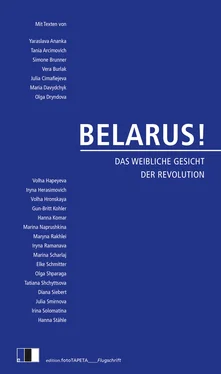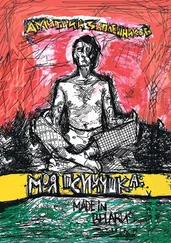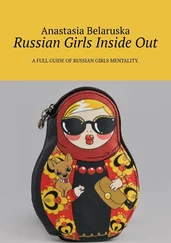DAS WEIBLICHE GESICHT
DER REVOLUTION
Herausgegeben von
Andreas Rostek | Nina Weller | Thomas Weiler | Tina Wünschmann
Mit Beiträgen von
Yaraslava Ananka | Tania Arcimovich | Simone Brunner | Vera Burlak Julia Cimafiejeva | Maria Davydchyk | Olga Dryndova | Volha Hapeyeva Iryna Herasimovich | Volha Hronskaya | Gun-Britt Kohler | Hanna Komar Marina Naprushkina | Maryna Rakhlei | Iryna Ramanava | Marina Scharlaj Elke Schmitter | Olga Shparaga | Tatiana Shchyttsova | Diana Siebert Julia Smirnova | Irina Solomatina | Hanna Stähle

Julia Cimafiejeva
My European Poem
Vorbemerkung
Ein Aufstand der Frauen
Iryna Herasimovich
Die Kraft des Unwissens
Olga Dryndova
Corona, Politisierung und Selbstorganisation
Marina Scharlaj
Belarus als Frau und die Frauen von Belarus
Irina Solomatina
Die Revolution hat kein feministisches Gesicht
Tatiana Shchyttsova
Der traumatische Weg zum Neubeginn
Simone Brunner
Mit Cyber-Partisanen gegen Lukaschenko
Yaraslava Ananka
Eine belarusische Gesangsstunde
Olga Shparaga
„Wir brauchen eine starke Gesellschaft“
DOKUMENTE
Iryna Ramanava
Die Wurzeln der Gewalt
Tania Arcimovich
Die auf den Straßen tanzen
GEDICHTE
Vera Burlak / Julia Cimafiejeva / Volha Hapeyeva Volha Hronskaya / Hanna Komar
Maryna Rakhlei
Die Nation im Schrank
Diana Siebert
Keine Lust mehr, Gattinnen von Partisanen zu sein
Gun-Britt Kohler
Belarusisch und Russisch
Marina Naprushkina
Wer, wenn nicht wir. Wann, wenn nicht jetzt
STIMMEN AUS BELARUS
Julia Smirnova
Ein Spiegel für Russland
Maria Davydchyk
EU und Belarus – nebenan in Europa
Hanna Stähle
Europa braucht eine Belarus-Strategie
Elke Schmitter
Und Deutschland?
DIE CHRONIK
Julia Cimafiejeva
This poem should be written in English.
This poem should be written in German.
This poem should be written in French,
In Swedish, in Spanish, in my adorable Norwegian,
Maybe in Finnish, Danish and Dutch.
Baltic languages should decide for themselves.
No Belarusian version for the poem,
No Russian version for the poem,
No Ukrainian version for the poem.
The rest are at your choice.
This poem should be written in the languages
Of human rights organizations,
Of those multiple expressed concerns
by European politicians.
So
Shall I get used to the thought
That I could be taken to prison
By the men wearing black,
By the men in plain clothes,
By the men with four fat letters
On their fat black backs?
Otherwise, my country
Won’t gain any freedom.
And it could not work anyways,
As usual.
Shall I take it calmly that I
Could be beaten and ultimately
Found guilty for that because
(They would say)
I cried antistate slogans like “Freedom!”
Or “Release all political prisoners!”
Though I would not need to cry them out at all
(Like my Facebook friends and thousands of
Someone else’s friends)
In order to be arrested or beaten.
I won’t have to cry anything,
I won’t have to do anything,
Just stand silently, just be.
I know I have to get used to that thought
Just in case, because it’s so likely to happen.
(Oh, my! I haven’t saved those telephones yet
Whom to contact in case of detention.)
I can’t say that in Belarusian,
I can’t say that in Russian,
I can’t say that in Ukrainian,
Only in English: I am afraid,
Only in German: Ich habe Angst,
Only in Norwegian: Jeg er redd.
That’s enough, for other variants,
Please, use Google translate.
The translations should be more
Or less accurate. These are not
Those strange East European languages
With their funny Cyrillic letters.
I’m afraid
Like you would be in my place,
If you lived in a country that is not free
Where they’ve had the same president
For 26 (!) years. Oh, my god! more than
Two thirds of my life I’ve spent
Under the power of a crazy person
Whom I’ve never voted for!
Sorry, it’s a long poem,
Because it’s a long story,
I spent more than two thirds of my life
Under the power of the man
I’ve never voted for,
Who harassed and suppressed and killed
(They say).
And when I come to the literary festivals abroad,
And when I speak English
I try to tell the complicated history of my country
(When I am asked)
As if I am another person,
As if I am like all those European poets and writers,
Who do not have to get used to the thought
That they could be arrested and beaten
For the sake of their country’s freedom.
As if my ugly history is just a harsh story
That I can easily put out from the Anthology of
Modern European short stories because
It’s too long,
And too dull.
When I tell it in English,
I want to pretend that I am you,
That I don’t have that painful experience
Of constant protesting and constant failing,
That nasty feeling of frustration and dismay.
I want to pretend that I have a hope,
Because when I tell it in Belarusian
I realize, we all realize, there is none
We can look forward to.
So forgive me my nagging in a half-broken English,
My Eastern European neverending complaints,
As having read the books you’ve read,
I still want to have a hope,
I still believe I have a right for a hope,
That hope could build its nest
On my roof and sing its songs
In Belarusian
(Not in Russian).
Vorbemerkung
Seit den gefälschten Wahlen in Belarus am 9. August 2020 bis zu dem Tag, an dem dieses Buch in den Druck geht, dem 3. November, sind 86 Tage vergangen. In dieser Zeit gab es Proteste und Demonstrationen in Minsk, in Homieĺ, in Brest, in Hrodna, in vielen Städten von Belarus. Zehntausende, Hunderttausende waren und sind auf den Straßen und Plätzen, Tausende wurden von OMON-Schlägern aufgegriffen, in anonymen Transportern verschleppt, in überfüllte Zellen gesteckt. Brutale Schläge, unzählige Verletzte, eine unbekannte Zahl von Verschwundenen, mindestens vier Tote unter den Protestierenden bis zu diesem Datum – das Regime wehrt sich mit seinen Mitteln.
Und es wird der Lage nicht mehr Herr. In Belarus ist eine ganze Gesellschaft erwacht und will keine Ruhe mehr geben.
Die Revolution in Belarus hat viele Gesichter. Die Proteste gegen die offensichtlich gefälschten Präsidentschaftswahlen werden von Menschen aller Schichten getragen – Arbeiter, Rentnerinnen, Kulturschaffende, IT-Fachleute, Studierende – alle gehen sie auf die Straße. Die Bilder in Weiß gekleideter Frauen mit Blumen vor bewaffneten schwarz vermummten „Sicherheitskräften“ gingen um die Welt, und sie sind eindrucksvoll.
Der Eindruck ist nicht falsch: Der Aufstand im Land ist ein Aufstand der Frauen, wenn auch nicht allein der Frauen. Aber was genau ist das „weibliche Gesicht“ der Revolution: eine reale Kraft, ein medialer Effekt? Kitsch mit weiterhin patriarchalem Unterbau oder zukunftsweisende Dynamik des gesellschaftlichen Umbaus?
Читать дальше








